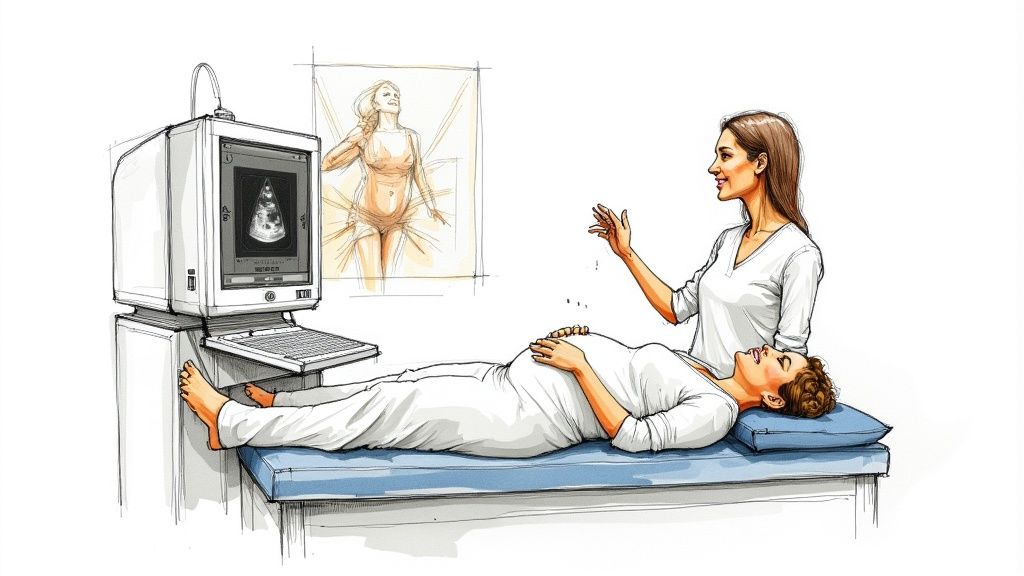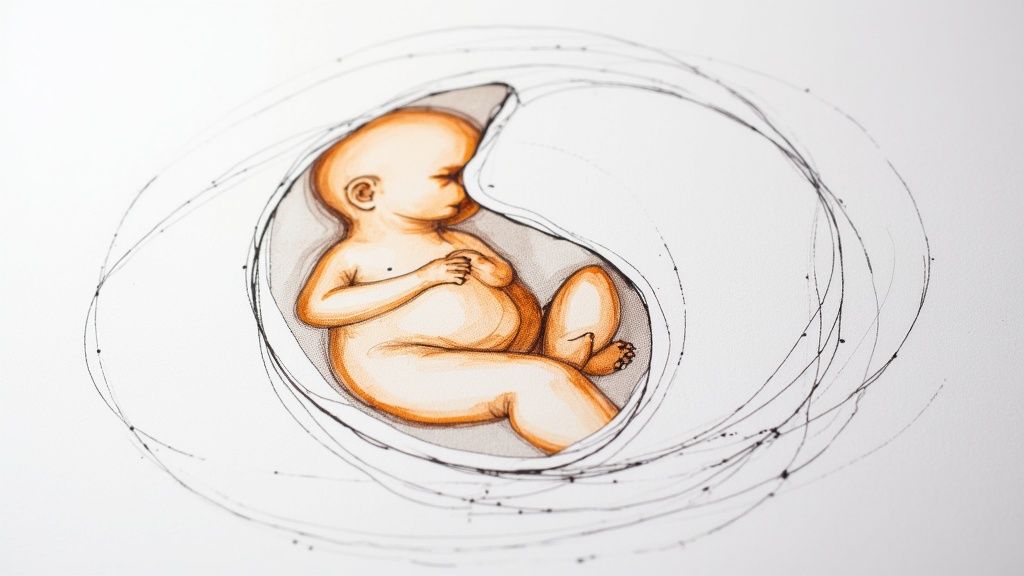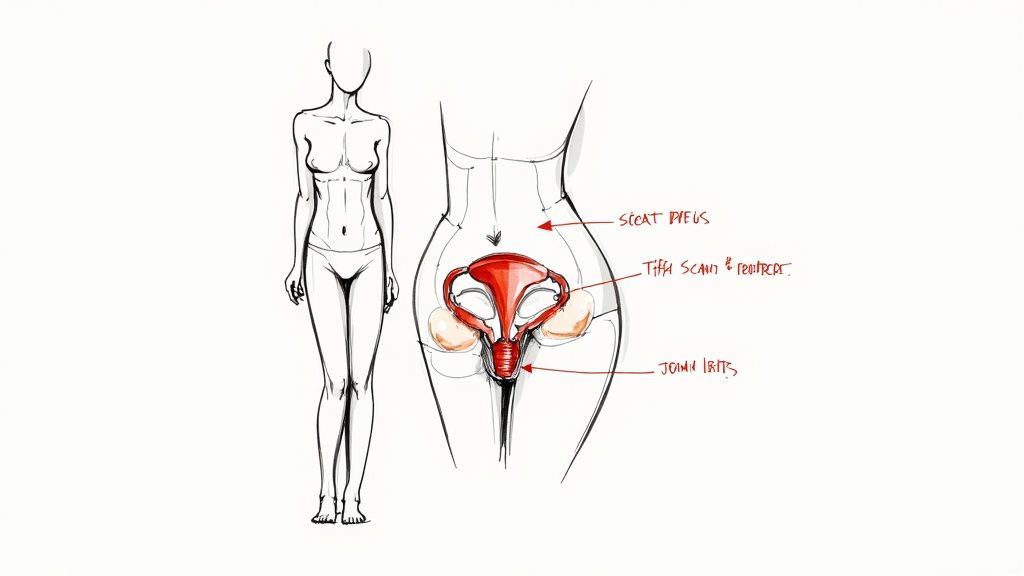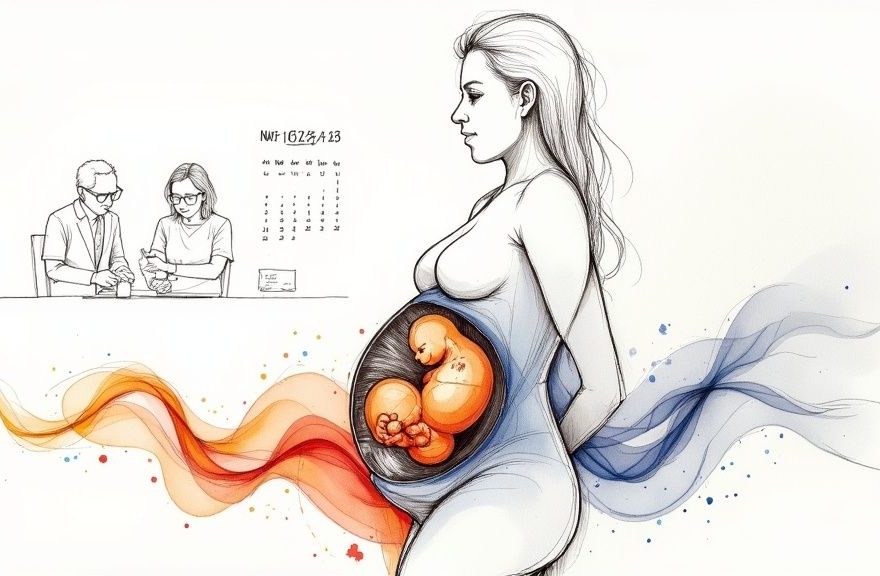Inside the TIFFA Scan: What Medical Experts Want You to Know

When you’re expecting, a TIFFA scan (targeted imaging for fetal anomalies) or Level II ultrasound provides you and your doctor with a remarkably clear view of your developing baby. Unlike standard ultrasounds, this detailed scan thoroughly assesses your baby’s growth and development. It’s one of the most crucial tools doctors rely on during pregnancy to identify potential concerns early, enabling parents and medical teams to make informed decisions about pregnancy care.
Why the Timing Matters: The 18-23 Week Window
Doctors recommend TIFFA scans between weeks 18 and 23 of pregnancy for a good reason. At this point, your baby has developed enough for their organs to be visible and evaluated for proper growth. The amount of amniotic fluid surrounding your baby creates ideal viewing conditions—there’s enough space to see all the important details, but your baby isn’t so large that it obstructs the view. This optimal timing allows doctors to detect any potential issues while there’s still time to plan.
How TIFFA Differs From Routine Scans
Consider a TIFFA scan as the high-definition version of regular ultrasounds. While routine scans provide a basic image of your baby, TIFFA technology produces crystal-clear images that enable doctors to examine specific organs in remarkable detail. They can assess your baby’s heart chambers, brain structures, and kidney formation with much greater accuracy. The scan also measures your baby’s growth, checks the position of the placenta, and evaluates amniotic fluid levels—offering you and your doctor a comprehensive view of your baby’s health.
A Closer Look at the Technology
The technology behind a TIFFA scan is intriguing. It operates like underwater radar—a handheld device called a transducer sends sound waves through your abdomen, and these waves bounce back to create detailed images of your baby. The special high-frequency waves used in TIFFA scans generate much sharper images than standard ultrasounds. This allows doctors to detect even the smallest details in your baby’s development that may require attention.
The Gold Standard in Prenatal Screening
TIFFA scans assist doctors in identifying potential health issues early on, ranging from heart conditions to spine development. While the majority of scans reveal perfectly healthy babies, having this detailed information allows everyone to prepare more effectively. If the scan uncovers anything unexpected, you and your medical team can discuss your options early and plan for any special care your baby may require after birth. For many parents, the TIFFA scan offers reassuring insights into their baby’s growth and development, while equipping doctors with the detailed information necessary to provide optimal care.
Understanding Your Baby’s Development Through TIFFA

A TIFFA scan provides parents with a comprehensive view of their baby’s growth and development during pregnancy. Unlike standard ultrasounds, this detailed scan offers doctors a clear perspective on your baby’s organs, physical characteristics, and overall progress. This information is crucial for both you and your medical team to make informed decisions regarding your baby’s health.
Key Areas Assessed by a TIFFA Scan
During a TIFFA scan, doctors evaluate several key aspects of your baby’s development to gain a thorough understanding of their health:
- Brain Development: The scan assesses how the brain is developing, including its size, shape, and the fluid-filled spaces known as ventricles. Doctors also ensure that the neural tube has closed properly.
- Heart Health: Your doctor will examine all four chambers of your baby’s heart to confirm they are functioning well together. This early assessment helps identify any potential heart issues.
- Spine and Skeletal System: The scan examines your baby’s backbone and rib cage to make sure they’re forming correctly. This helps find conditions like spina bifida if they’re present.
- Facial Features: The scan provides clear images of your baby’s face, allowing doctors to check for conditions such as cleft lip or palate.
- Limb Development: Your doctor will assess your baby’s arms, legs, fingers, and toes to ensure they are growing normally.
- Internal Organs: The scan examines vital organs such as the kidneys, stomach, and bladder to ensure they are developing properly.
- Growth Metrics: Your doctor will assess your baby’s size and weight to confirm they are growing as expected. They will also evaluate the amount of amniotic fluid, which is crucial for your baby’s well-being.
- Placental Position: The scan reveals the location of the placenta, as its position can influence your pregnancy and delivery.
Early Detection and Improved Outcomes
One of the key advantages of a TIFFA scan is the early identification of potential issues. For instance, if doctors detect a heart condition, they can arrange appropriate care for your baby upon birth. Early detection also allows parents to gather information, ask questions, and connect with other families who have faced similar situations.
Interpreting the Results: A Collaborative Approach
While TIFFA scans offer valuable insights, they are just one component of your prenatal care. Your doctor will assist you in understanding the scan results and their implications for your baby. They can address your concerns and outline the next steps based on what the scan reveals. Most often, TIFFA scans indicate that babies are developing normally, providing reassurance to parents. However, even if the scan uncovers potential issues, this information is vital for ensuring you and your baby receive the best care possible.
Preparing for Your Scan: Expert-Backed Guidelines
Preparing for your TIFFA scan marks an important milestone in your pregnancy journey. This comprehensive ultrasound provides you and your healthcare team with a clear picture of your baby’s development. While we’ve discussed the scan’s purpose and significance earlier, let’s focus on practical steps you can take to maximize this important appointment. Proper preparation helps ensure the clearest images, leading to more accurate results.
Optimizing Visualization: What You Can Do
Several simple factors can influence how well the sonographer can visualize your baby during the scan. For many women, having a full bladder can enhance image quality, particularly in the early stages of pregnancy. Your doctor will inform you whether you need to have a full or empty bladder for your specific appointment. Additionally, certain foods and drinks may impact the levels of amniotic fluid or your baby’s activity during the scan. Always consult your healthcare team for any specific preparation instructions they recommend for your situation.
Fetal Positioning: Encouraging Movement
At times, your baby may be positioned in a way that makes it difficult to see certain areas clearly. This could result in a longer scan duration or the need to schedule another appointment. Similar to capturing the perfect photo angle, small adjustments can significantly improve visibility. If necessary, your sonographer might suggest that you change your position slightly or have a light snack to encourage your baby to move into a more favorable position for viewing.
Managing Scan Anxiety: Practical Tips
It’s completely normal to feel anxious before your TIFFA scan—most parents seek reassurance about their baby’s development. To help ease your nerves, consider trying some simple relaxation techniques, such as taking slow, deep breaths or listening to your favorite calming music. Preparing a list of questions in advance can also help you feel more organized and in control of the situation.
Communicating With Your Healthcare Provider: A Checklist
Effective communication with your doctor or midwife is essential for maximizing your pregnancy care, particularly regarding important tests like the TIFFA scan. Before your appointment, jot down any questions you have. You may want to inquire about the specific conditions they are checking for, the significance of the various measurements, or the next steps if something unusual is detected. Being prepared with your questions ensures you grasp all aspects of your baby’s development. Keep in mind that this scan is a crucial tool that provides valuable insights into your baby’s health and growth. Taking the time to prepare can make the experience more seamless and informative.
Decoding Your TIFFA Results With Confidence

Receiving your TIFFA scan report during pregnancy can be daunting due to the medical jargon and intricate measurements. However, understanding these results doesn’t have to be a challenge. Let’s simplify what these findings indicate for you and your baby’s development, empowering you to feel more informed and confident about your prenatal care.
Understanding the Measurements: What the Numbers Mean
Your TIFFA scan report features several key measurements that help monitor your baby’s growth. Your doctor will assess three primary aspects: head circumference, abdominal circumference, and femur (thigh bone) length. These measurements, presented in millimeters or percentiles, are compared to standard ranges for babies at your stage of pregnancy. For instance, if your baby’s head measurement is in the 50th percentile, it indicates that it’s right in the middle of the normal range. The scan also evaluates amniotic fluid levels, which are crucial for your baby’s development and comfort.
Evaluating Fetal Anatomy: A Detailed Look Inside
The TIFFA scan does more than just take measurements; it provides doctors with a comprehensive view of your baby’s organs and structures. During the scan, your doctor will examine your baby’s heart chambers, brain development, spine formation, and kidney function. Think of it as a detailed preview of your baby—the scan reveals how each part is developing and functioning together. This thorough examination helps ensure that everything is progressing as expected.
Identifying Potential Concerns: What Requires Further Attention?
While most TIFFA scans indicate normal development, there are times when results may warrant a closer examination. If any measurements appear unusual or if certain features need clarification, your doctor may recommend additional tests. This could involve another ultrasound, some genetic testing, or a referral to a specialist. Keep in mind that the need for further tests doesn’t necessarily indicate a problem. Often, it simply reflects your medical team’s commitment to providing you and your baby with the best possible care.
Putting It All Together: How TIFFA Results Shape Your Prenatal Care
Your TIFFA scan results play a crucial role in guiding your prenatal care moving forward. If everything appears normal, these results offer reassuring confirmation of your baby’s health. However, if the scan identifies anything that requires monitoring, your doctor can modify your care plan—perhaps scheduling extra check-ups or connecting you with specialists. In any case, understanding your TIFFA results empowers you to take an active role in your prenatal care. When you are informed about your baby’s development, you can make better decisions throughout your pregnancy journey and feel more confident in the care you are receiving.
Addressing Your TIFFA Scan Concerns

Many expectant parents have questions and concerns about medical procedures during pregnancy. While TIFFA scans offer important insights into your baby’s development, it’s completely normal to feel anxious about the process. Let’s address some common worries and questions regarding TIFFA scans to help ease your mind.
Is a TIFFA Scan Safe for My Baby?
The safety of TIFFA scans is a frequent concern among parents-to-be. You’ll be relieved to know that these scans are very safe for both you and your baby. Unlike X-rays, TIFFA scans utilize gentle sound waves to produce images. Extensive research involving millions of pregnancies has shown no harmful effects from ultrasound technology. The crucial information these scans provide about your baby’s growth and development makes them a vital part of prenatal care.
How Accurate Is a TIFFA Scan in Pregnancy?
While TIFFA scans offer doctors a detailed view of your baby, it’s essential to recognize their limitations. Several factors can influence scan accuracy, such as your baby’s position during the scan, the amount of amniotic fluid, and your doctor’s level of experience. Some conditions may be more challenging to detect; for example, certain heart issues might not be evident until after birth. Nevertheless, TIFFA scans are effective in identifying many potential concerns early, allowing you and your healthcare team to plan appropriate care if necessary.
What if My TIFFA Scan Shows Something Unusual?
Discovering that your scan revealed something unexpected can be daunting. Keep in mind that follow-up tests don’t always indicate a problem; they often serve to gather more detailed information. Your doctor may suggest additional ultrasounds or other tests to clarify the situation. For instance, if there are concerns about your baby’s heart, you might consult a heart specialist who can offer expert advice both before and after your baby is born.
Managing Anxiety and Uncertainty
Feeling anxious while waiting for results or needing additional tests is completely normal. During this period, it’s important to maintain open communication with your doctor about any worries you have. Don’t hesitate to ask questions as they arise—there are no silly questions when it comes to your baby’s health. Many parents find it beneficial to connect with other expectant parents through local support groups or online forums. Having a support network of people who understand your situation, along with clear medical guidance, can help make this time feel less overwhelming and more manageable.
Building Your Post-TIFFA Care Plan
Once you’ve completed your TIFFA scan during pregnancy, collaborating with your doctor to develop a personalized care plan is crucial. This plan will serve as a roadmap for the remainder of your pregnancy, tailored to your specific scan results. Let’s take a look at how various findings can influence your care options and the steps you may need to take moving forward.
Routine Monitoring and Specialized Attention
For most women with normal TIFFA results, standard prenatal check-ups will continue to monitor their baby’s growth and development. However, if your scan reveals any issues, you will receive more specialized care. For example, if a heart problem is detected, your doctor will refer you to a pediatric cardiologist for a thorough assessment. This proactive approach ensures that your baby receives the appropriate care both before and after birth.
Additional Screenings and Coordinated Care
Based on your TIFFA results, your doctor may recommend additional tests. These could include follow-up ultrasounds to examine specific areas in greater detail or genetic testing to gain a clearer understanding of certain conditions. Your healthcare team will collaborate closely—from your primary doctor to any specialists involved—ensuring that everyone is aligned with your care plan.
Preparing for Delivery and Maintaining Fetal Health
Your TIFFA scan provides valuable insights for delivery planning by revealing your baby’s position, the location of the placenta, and assessing amniotic fluid levels. This information assists your doctor in determining if a natural birth is possible or if a C-section may be necessary. Additionally, your care plan will offer tailored guidance on diet, exercise, and check-ups to ensure both you and your baby remain healthy during the pregnancy.
Example Post-TIFFA Care Plans
| TIFFA Scan Finding | Potential Next Steps |
|---|---|
| Normal Scan | Routine prenatal care, healthy lifestyle choices |
| Heart Abnormality | Referral to pediatric cardiologist, further ultrasounds, specialized delivery plan |
| Low Amniotic Fluid Levels | Increased monitoring, additional ultrasounds, potential interventions |
| Placenta Previa | Close monitoring, potential Cesarean delivery |
Your TIFFA scan results provide a clear direction for your pregnancy care. By adhering to your personalized plan and maintaining regular communication with your healthcare team, you can feel assured about making the best decisions for yourself and your baby.
Are you seeking additional support during your pregnancy? Pregnancy 101 offers expert-led sessions that cover prenatal care, Garbh Sanskar, and other vital topics. With flexible scheduling and knowledgeable instructors, we assist expectant mothers throughout India in accessing the information they need. Visit our website to find out more and become part of our supportive community of future moms.

